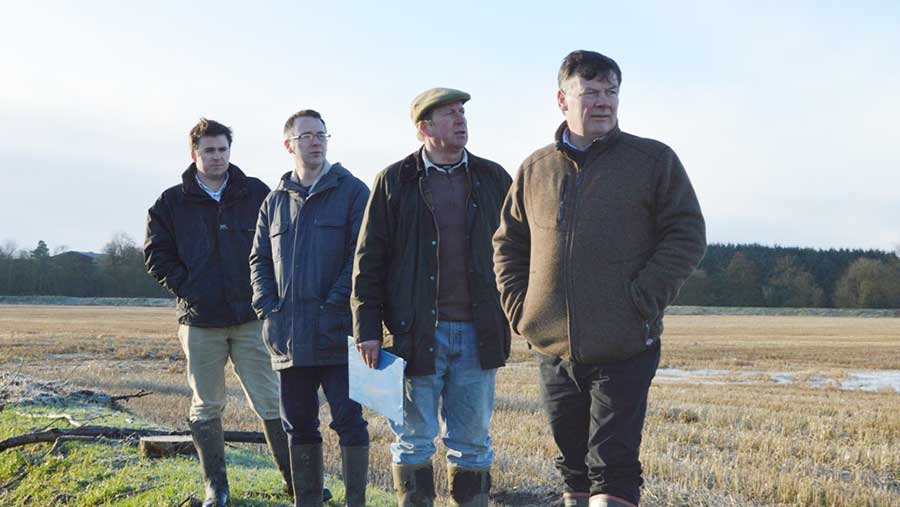Farm leaders visit flood-devastated Perthshire
 Left to right: Local farmer Rob Strachan, NFUS chief executive Scott Walker, local farmer Bob Strachan and president Allan Bowie. © NFU Scotland
Left to right: Local farmer Rob Strachan, NFUS chief executive Scott Walker, local farmer Bob Strachan and president Allan Bowie. © NFU Scotland NFU Scotland (NFUS) president Allan Bowie has visited farms in Perthshire to see the devastation left behind by the floods.
Mr Bowie joined NFUS chief executive Scott Walker to see first hand the damage caused by the unprecedented flooding in recent days on farms.
Three flood-hit farmers were visited on Friday (8 January) in the Blairgowrie and Coupar Angus area – Bob Strachan, Peter Grewar and Ian McLaren.
See also: Insurance bill for flood-hit farms rises to more than £40m
Heavy rains and strong winds battered central and north-east Scotland last weekend and downpours continued during the week. Large swathes of farmland were left saturated with water up to 4ft high in places.
The visits come as the Met Office confirmed last month was the wettest December in Scotland since records began in 1910 and that the total rain that fell throughout 2015 was the second highest on record, exceeded only in 2010.
Mr Bowie said: “With waters starting to recede in the Perthshire area, we were able to view the damage caused by the recent floodwaters on these farms.
“Flood banks damaged and washed away, debris on fields, topsoil no longer there; these are just some of the many issues we saw today and that many other farmers will have to tackle in the coming weeks as waters recede.”
After surveying the damage for himself, Mr Bowie called on the Scottish Environment Protection Agency (Sepa) and the Scottish government to give greater powers to farmers to manage watercourses.
He said: “We need the Scottish government and Sepa to work with us on freeing up the rules to allow proper watercourse management.
“Farmers know how to achieve a faster flow of water through the rivers to the sea in order to remove the risk of flooding homes and businesses.
“The Scottish government and Sepa need to learn the lessons from the damage across Scotland and give the flexibility needed to make the water flow in our rivers, burns and ditches and in so doing, reduce the risk of flooding.”

Assessing the flood damage at Lochlands Farm, near Blairgowrie. © NFU Scotland
In the short term, NFU Scotland is urging the Scottish government to consider making funds available to rebuild any damaged flood defences and help reinstate flooded land back into production, mirroring the Farming Recovery Fund established by Defra in England and Wales. In the longer term, the union says ongoing political commitment to finding solutions will be needed to not only recover from the immediate problems, but build long-term resilience into farming systems to endure such weather events. Following floods in 2013, Sepa and the Scottish government showed a willingness to work with the industry on flooding.
Measures agreed two years ago saw an increased width of dredging permitted in certain types of watercourse and introduced a catchment licence where groups of farmers could work together on river course management.
NFUS leaders will meet with government and Sepa officials this week to discuss the response to the floods.
Terry A’Hearn, Sepa chief executive, said farmers were permitted to carry out some repair work without needing to contact his agency.
This includes:
- Works to repair or replace structures, like for like, that have failed or washed away. This includes embankments and bridges
- Removing vegetation
- Removing fallen trees or litter
- Dredging small straightened ditches of less than 1m width across the bed
- Dredging within closed culverts, and up to 10m either side.
Mr A’Hearn said: “Contrary to some reports, there is repair work that can be carried out without the need for authorisation from, or contact with, Sepa.
“This includes works to repair or replace like for like structures that have failed or washed away, dredging small straightened ditches, and removing vegetation and fallen trees. If you’re unsure whether the work you want to carry out fits into this category you are always welcome to contact one of our offices and talk it through with one of our officers.
“There is more significant work that will need a registration or licence and we operate a fast-track process to ensure rapid authorisation if required in emergency situations. If you are considering this kind of work, I encourage you to discuss your proposals as soon as possible with your local Sepa branch, where our officers are ready to assist.”
More information on the Sepa website.
